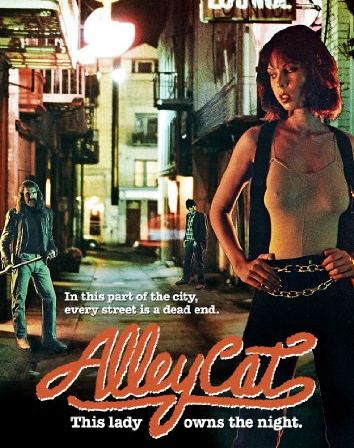★★
“An arrowing experience.”
 Lauren Pierce (Noble) is an expert archer, leading her high-school team. However, after she rescues a friend from sexual harassment, she finds herself on the wrong side of justice, and is sent to “Paradise Trails”, an incongruously-named juvenile detention facility, where harsh discipline and indefinitely extended sentences are the order of the day. And wouldn’t you know it, the place is run by a former Olympic archer – Bob Patrice (Sage) and his creepy son, Michael (Terry). It’s not long before Lauren is plotting an unofficial departure, along with new friend Becky (Mason), who knows the truth about what’s going on behind the scenes. When they get evidence proving it during their exit, they become the hunted as Bob and Michael will go to any lengths to stop the truth from getting out.
Lauren Pierce (Noble) is an expert archer, leading her high-school team. However, after she rescues a friend from sexual harassment, she finds herself on the wrong side of justice, and is sent to “Paradise Trails”, an incongruously-named juvenile detention facility, where harsh discipline and indefinitely extended sentences are the order of the day. And wouldn’t you know it, the place is run by a former Olympic archer – Bob Patrice (Sage) and his creepy son, Michael (Terry). It’s not long before Lauren is plotting an unofficial departure, along with new friend Becky (Mason), who knows the truth about what’s going on behind the scenes. When they get evidence proving it during their exit, they become the hunted as Bob and Michael will go to any lengths to stop the truth from getting out.
Opening with a claim about being “inspired by true events,” apparently that means the “kids for cash” scandal from Pennsylvania. While there’s nothing wrong with that as inspiration, it’s probably a mistake for the makers, apparently to want to make a serious statement, while adopting the tropes of the juvenile delinquent and women in prison genres. Brutal wardens; sadistic guards; lesbian subtexts… This all makes it kinda tough to take seriously, whatever statement they’re trying to make. And even that’s kinda muddied, beyond “sending kids to jail for bribes is bad.” Not much to argue with there. Probably more questionable, is the way every man here is an utter bastard. It gets kinda tiresome.
The main problem, however, is simply taking too long to get anywhere. The final 20 minutes or so, have Lauren and Becky trying to get through the wilderness around the facility, with Bob and Michael in pursuit. It’s well-crafted and tense, even if it builds to the inevitable final, bow-powered confrontation between Lauren and Bob, which you can see coming from a long way off. Unfortunately… it’s the final 20 minutes. The first hour are a real slog to get through, particularly the chunk after Lauren’s arrival at Paradise Trails. The script doesn’t have any real idea about where it needs to go or what it wants to do, once the basic concepts are established. As a result, it and the characters simply rotate gently in the wind, as interest evaporates gently.
There’s not even any real logic in the concept. Lauren is supposedly a “straight A’s” student with no previous record. Could have fooled me, going by the hyper-aggressive way she beats up on her pal’s boyfriend. That shows experience in the kicking of ass. Been nice if her ability to defend herself had come into play in the facility a bit more. Except, acknowledging women’s ability to be violent might have gone against the narrative apparently being peddled here. In that light, even the heroine’s use of a bow seems like some kind of liberal cop-out to avoid giving her the far more effective force multiplier of a fire-arm.
Dir: Valerie Weiss
Star: Bailey Noble, Bill Sage, Jeanine Mason, Michael Grant Terry





 Is it possible for a homage to be too accurate? This could be the problem here. It’s clear that Bickert has a deep affection for the “women in prison” genre – yet, again, possibly too much so. For this is less a parody or a pastiche than a loving re-creation, and doesn’t understand that a lot of these movies… well, to be honest, they suck. Badly acted, poorly plotted, thinly-disguised excuses for porn. And that’s the
Is it possible for a homage to be too accurate? This could be the problem here. It’s clear that Bickert has a deep affection for the “women in prison” genre – yet, again, possibly too much so. For this is less a parody or a pastiche than a loving re-creation, and doesn’t understand that a lot of these movies… well, to be honest, they suck. Badly acted, poorly plotted, thinly-disguised excuses for porn. And that’s the 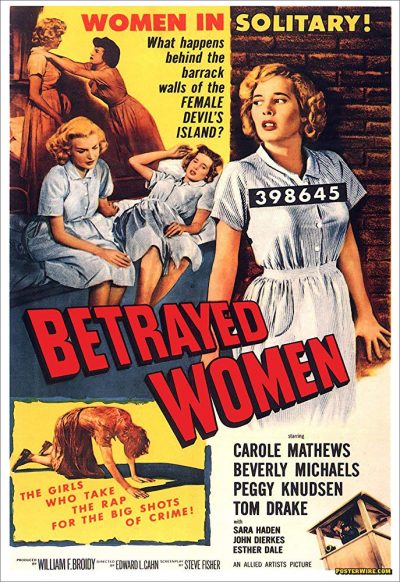 First, let me just say: that poster is a true work of art. Seriously, how can anyone look at that and
First, let me just say: that poster is a true work of art. Seriously, how can anyone look at that and 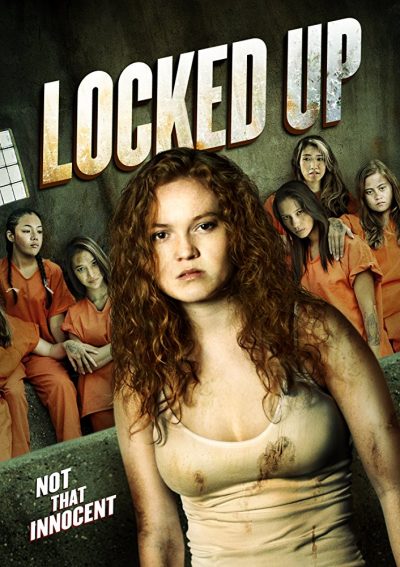 Do not mistake the above rating for suggesting that this is a “good” movie. By most normal standards, it would hardly qualify. But what we have is a throwback to the glory days of exploitation, in particular Filipino women-in-prison flicks like The Big Doll House or
Do not mistake the above rating for suggesting that this is a “good” movie. By most normal standards, it would hardly qualify. But what we have is a throwback to the glory days of exploitation, in particular Filipino women-in-prison flicks like The Big Doll House or  The handling of this story is a little different from the usual novel. Julien adopts an “episodic” approach, with the story initially released in novella-length installments (seven of which have come out to the point of writing), some with cliffhangers. In structure, this is almost like the
The handling of this story is a little different from the usual novel. Julien adopts an “episodic” approach, with the story initially released in novella-length installments (seven of which have come out to the point of writing), some with cliffhangers. In structure, this is almost like the 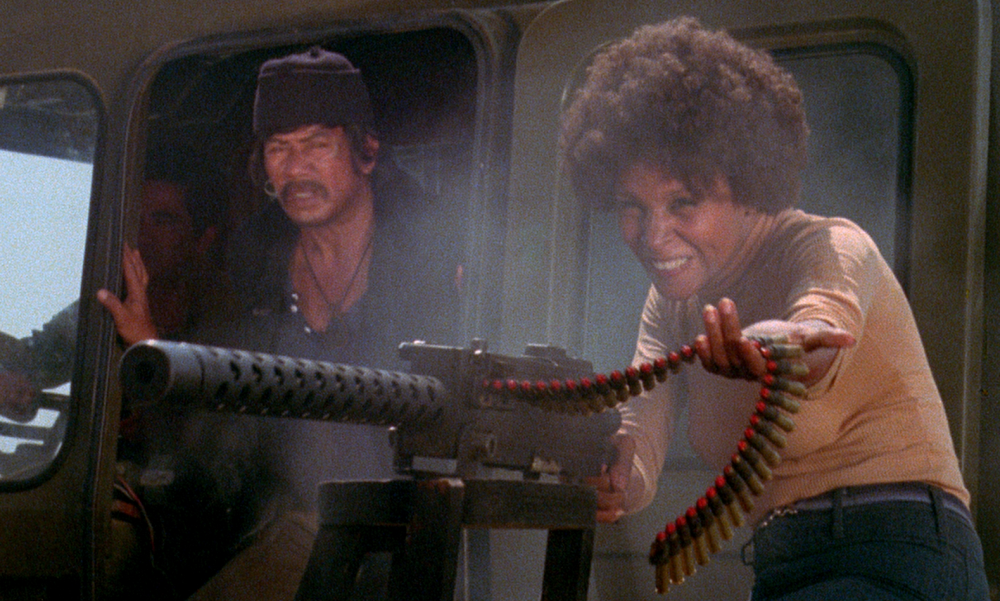 Both Bell and Katon had worked with Santiago before, in
Both Bell and Katon had worked with Santiago before, in 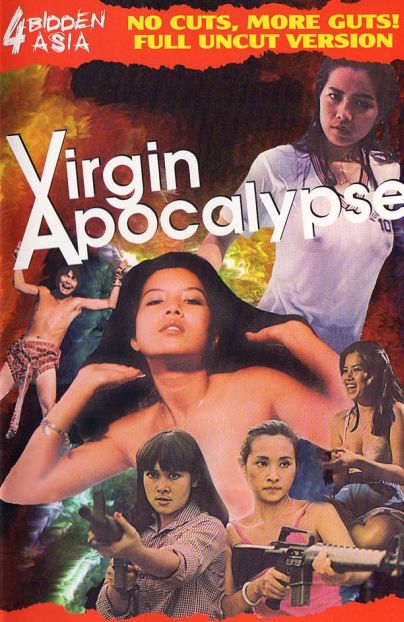

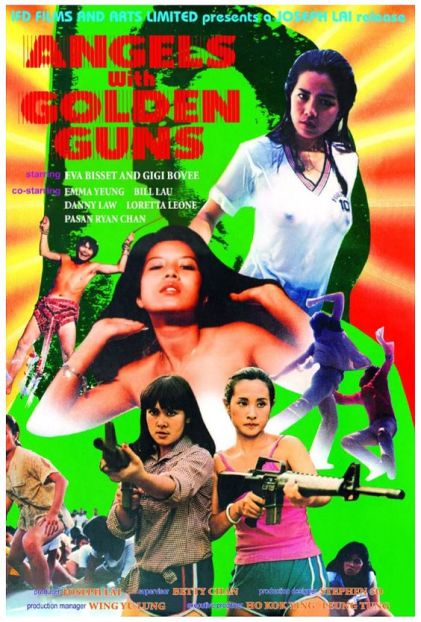
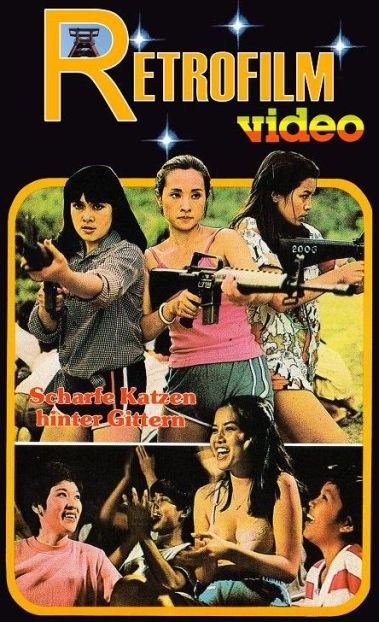
 Movie stunt-woman Laurie Collins (Chase) is out for the night with her sister, Bonnie, until the latter accepts the company of a young man. When things get more than a bit rape-y, and Bonnie ends up shooting her attacker dead. She is convicted of second-degree manslaughter, much to the chagrin of her sister. Worse is to follow after Bonnie is sent to prison, as there, she then falls foul of the jail’s top dog, Kay Butler (Martin). Bonnie soon turns up a corpse, with the incident written off as suicide, due to the heroine found in her veins. But Laurie doesn’t believe a word of it, and deliberately commits grand theft auto, among other crimes, in order to be sent to the same prison, where she can find those responsible, and make them pay for what they did to Bonnie.
Movie stunt-woman Laurie Collins (Chase) is out for the night with her sister, Bonnie, until the latter accepts the company of a young man. When things get more than a bit rape-y, and Bonnie ends up shooting her attacker dead. She is convicted of second-degree manslaughter, much to the chagrin of her sister. Worse is to follow after Bonnie is sent to prison, as there, she then falls foul of the jail’s top dog, Kay Butler (Martin). Bonnie soon turns up a corpse, with the incident written off as suicide, due to the heroine found in her veins. But Laurie doesn’t believe a word of it, and deliberately commits grand theft auto, among other crimes, in order to be sent to the same prison, where she can find those responsible, and make them pay for what they did to Bonnie.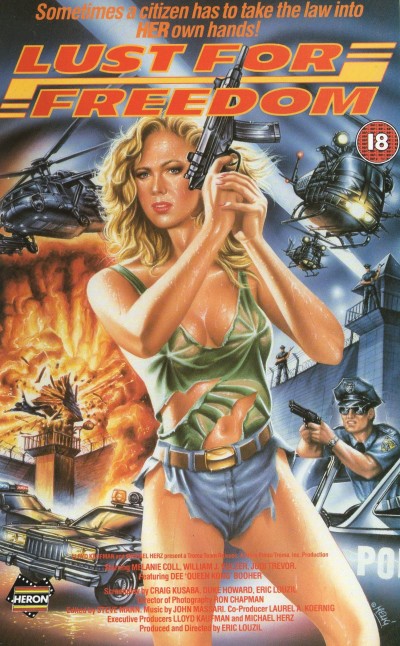 Undercover cop Gillian Kaites (Coll) needs a break from the force after an operation goes wrong, with her boyfriend and fellow cop being gunned down in front of her. She goes on a road-trip, but has the misfortune to go through a town where the local cops are in league with the prison to arrest fetching young ladies on fabricated charges. They can then be shipped off to jail and… Well, the script is kinda vague on the specific purpose behind this, clearly quite significant, operation involving a large number of people and no small effort. Let’s give them the benefit of the doubt, and presume the ends, whatever they may be, justify the means. Gillian ends up framed for drug possession, and has to survive against brutal guards, brutal fellow prisoners and matron Mrs. Puskar (Trevor) – in the interests of sustaining suspense, I will avoid revealing whether or not she is brutal. Eventually, the brutality on display becomes too much, and she leads the inmates in a revolt against their cruel captors. In other words: women in prison plot 3A.
Undercover cop Gillian Kaites (Coll) needs a break from the force after an operation goes wrong, with her boyfriend and fellow cop being gunned down in front of her. She goes on a road-trip, but has the misfortune to go through a town where the local cops are in league with the prison to arrest fetching young ladies on fabricated charges. They can then be shipped off to jail and… Well, the script is kinda vague on the specific purpose behind this, clearly quite significant, operation involving a large number of people and no small effort. Let’s give them the benefit of the doubt, and presume the ends, whatever they may be, justify the means. Gillian ends up framed for drug possession, and has to survive against brutal guards, brutal fellow prisoners and matron Mrs. Puskar (Trevor) – in the interests of sustaining suspense, I will avoid revealing whether or not she is brutal. Eventually, the brutality on display becomes too much, and she leads the inmates in a revolt against their cruel captors. In other words: women in prison plot 3A.